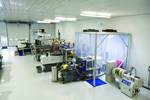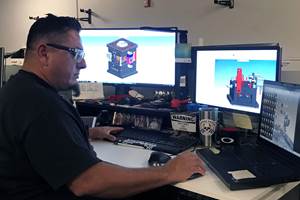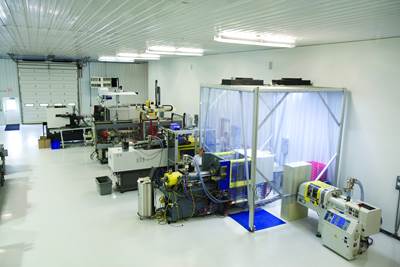ProMold Plastics: Modern Management Model Yields Success
“Our vision is to continue to be a valuable asset and resource in the injection molding industry and a preferred partner in the plastics industry, in addition to being a valuable asset to our customers.”
Since ProMold Plastics (Portland, CT) opened its doors in 1967 as a one-man operation, the company has evolved into a full-service mold manufacturer and molder in the medical, electronic and industrial markets. The current president Rick Puglielli took the reigns from his father Riccardo in 1999 and embraces a forward-thinking, continuous improvement management philosophy that has earned the company a solid reputation in the medical industry as well as ISO 13485 certification.
Over the years, ProMold’s biggest challenge has been with compliance to government and industry standards, Puglielli says, which is why he is particularly proud of the medical certification. “As a small company without a legal staff at our disposal, doing all of this takes a lot of hard work, confidence and commitment from all of your employees. So I took it upon myself to educate myself through classes and seminars to learn what needed to be done. I have made some mistakes along the way but learned a great deal in the process—which I passed along to my employees. Most important was having our employees understand that this makes us a better company. We did not go after this certification for marketing purposes. We put these quality systems in place to better serve the industry.”
A Team Effort
Puglielli emphasizes that everyone in the company plays a part in ProMold’s success. “Our entire team contributes to the collection of accurate and meaningful data used to measure operational performance and identify trends,” Puglielli elaborates. “This data is frequently reviewed to identify global systemic problems that need to be addressed. The source of the data is then investigated to identify root causes that impact the measurements and then preventive and corrective action is taken that addresses the major source of the problem. Everyone has a specific area to manage and control. For example, scrap can be monitored, measured and controlled. They have the authority to improve the process or buy equipment to alleviate the process.”
This aforementioned philosophy—along with adopting some of the practices he learned at various leadership training seminars—helped Puglielli formulate a number of principles to guide the company’s growth and develop a management model for success. “I wanted to break away from the old-school mentality of one person being in charge,” he explains. “I want to involve everyone. I find the right people and engage them to take charge so everyone can focus on what they do best.”
Puglielli breaks down his key principles in the following manner:
• Management Style: Learn what your management style is and how well it works—and what to do when it doesn't.
• Management Values: Determine what you value as a manager.
• Communication: Learn how to communicate your values.
• Employee Involvement: Discover how committed employees are when they understand your values and fall in line with them.
• Group Decision-Making/Team Building: Discover how easy it is to build teams to solve problems on their own.
• Empowerment: Discover how easy it is to hold employees accountable for results when you learn how to delegate authority and assign responsibility.
• Excellence in Supervision Training: Provide even the newest manager with a path for success enabling the entire company to grow.
“This management philosophy enables us to connect to our customers’ vision and become an integral part of their success,” Puglielli notes. “This is the one secret ingredient that helps us create a true supplier partnership with our customers. Part of leading a company is not only managing your employees but managing your customers’ expectations.”
New Markets
Puglielli would like to tap into new markets over the next year, most notably in consumer, industrial and some start-up medical products. “Most of it is small volume and quick turnaround,” he says. “We are relying on word-of-mouth and Internet searches to help us realize these goals.
“Our vision is to continue to be a valuable asset and resource in the injection molding industry and a preferred partner in the plastics industry,” Puglielli concludes, “in addition to being a valuable asset to our customers.”
Related Content
Editorial Guidelines: Editorial Advisory Board
The Editorial Advisory Board of MoldMaking Technology is made up of authorities with expertise within their respective business, industry, technology and profession. Their role is to advise on timely issues, trends, advances in the field, offer editorial thought and direction, review and comment on specific articles and generally act as a sounding board and a conscience for the publication.
Read MoreSteps for Determining Better Mold Prices
Improving your mold pricing requires a deeper understanding of your business.
Read MoreMold Design Review: The Complete Checklist
Gerardo (Jerry) Miranda III, former global tooling manager for Oakley sunglasses, reshares his complete mold design checklist, an essential part of the product time and cost-to-market process.
Read MoreMMT Chats: Solving Schedule and Capacity Challenges With ERP
For this MMT Chat, my guests hail from Omega Tool of Menomonee Falls, Wisconsin, who share their journey with using enterprise resource planning (ERP)—and their people—to solve their schedule and capacity load monitoring challenges.
Read MoreRead Next
Michigan Coast to Coast: Collaboration Expands Capabilities
The Michigan Coast to Coast Tool & Die Collaborative (MCCTD)—formed in 2008 under the Michigan Renaissance Zone Act (Renaissance zones are virtually free of all state and local taxes for businesses located within their boundaries)—is comprised of 13 companies (see MCCTD Members Sidebar, page xx) that joined forces to expand their own operations and support one another in a globally competitive market.
Read MoreHow to Use Continuing Education to Remain Competitive in Moldmaking
Continued training helps moldmakers make tooling decisions and properly use the latest cutting tool to efficiently machine high-quality molds.
Read MoreAre You a Moldmaker Considering 3D Printing? Consider the 3D Printing Workshop at NPE2024
Presentations will cover 3D printing for mold tooling, material innovation, product development, bridge production and full-scale, high-volume additive manufacturing.
Read More




















